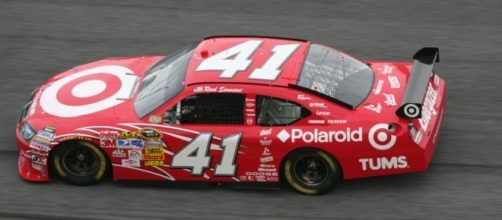The sponsorship deal between Target and Nascar's Chip Ganassi Racing has ended after 16 years. The Minneapolis-based chain retailer also announced its decision not to renew a contract with Cup driver Kyle Larson, one of the brightest young stars, who finishes second in the NASCAR Cup Series standings.
Larson said ending a sponsorship deal between its automotive racing organization and company would not affect his decision over whether or not should he stay with Ganassi in the future. Larson, a California native who has been sponsored by Target since his 2014 rookie season, seems confident that Ganassi will find corporate partners to sponsor its organization as well as the team.
Nielsen's media evolution "Sport24" program reported that Larson's car, along with all brands centered on his car's body, is worth $111 million. Target leads among brands the most valuable primary sponsor at the midway point of the season. Jimmy Spencer, a racing veteran who owns Ganassi, transported the car with the red-and-white Target logo during a NASCAR race since 2002.
Target has partnered with Ganassi and sponsored IndyCar, NASCAR, and sports-car programs for 28 years.
Sports sponsorship program on soccer
As Target exited its partnership with NASCAR, the company plans to concentrate on a sports sponsorship budget for soccer. In January 2017, as the company's Sports Marketing program was established, Target inked a deal with the local Major League Soccer franchise, the Minnesota United FC, as a corporate partner.
"We looked to evolve our sports marketing program, soccer provided Target with a unique opportunity to reach our guest in new places, and at all levels of the sport," Target said in a statement.
Target market: Brand take aim at U.S. soccer consumers
A marketing executive at the retail company said its interest in soccer among a number of the Target's core customer demographic groups, incorporating Hispanics, families, and millennials in the United States, has been growing dramatically. Soccer balls have been sold, and as a result, Target's sales in 2016 have improved by 10 percent.
"That is growing faster than any other sports category at Target," Rick Gomez, the retailer's senior vice president of marketing, told a newspaper reporter January 19, 2017.
As soccer popularity is on the rise in the U.S., brands are set to invest in the sport. Several marketing experts believe that soccer makes sense for Target to cater products to families as well as children. A few months ago, the company reached a partnership agreement with the U.S. Youth Soccer and awarded a $75,000 donation to the U.S. Soccer Foundation.
Unlike other sports, soccer remains the big challenge for advertisers because soccer broadcasts possess fewer commercials and therefore it creates limited advertising opportunities for commercials. Target, which signed a multi-pronged deal with the MLS in January, will be aired on Univision, Fox Sports, ESPN, and in-stadium experiences.
There is a speculation that young kids are playing the FIFA soccer video game more than sports car games, as far as the sports entertainment world is concerned.


